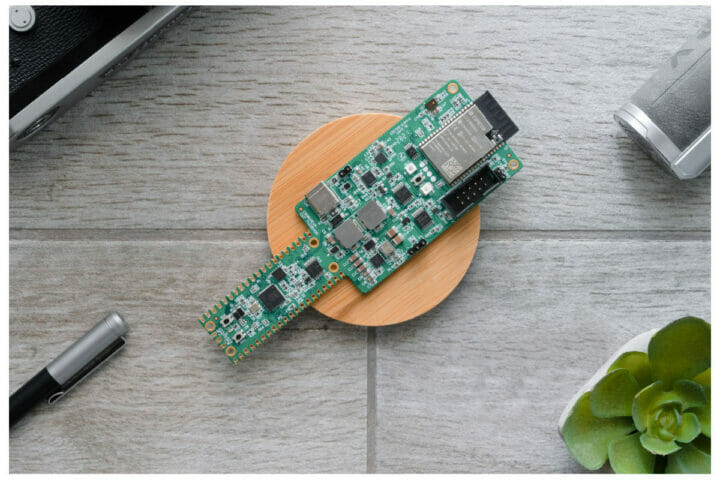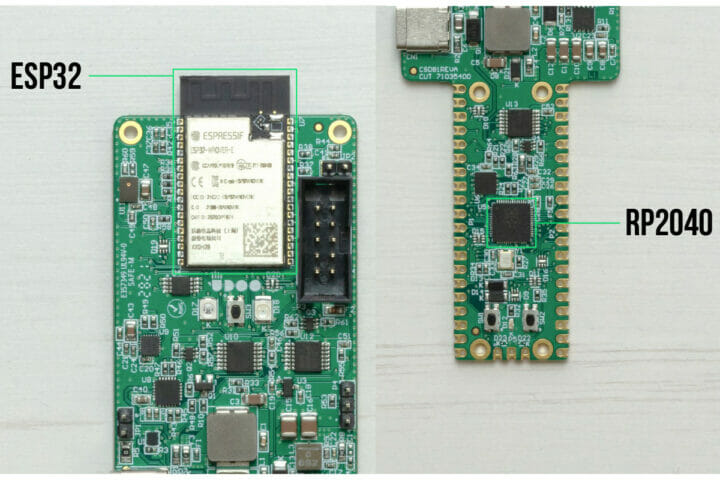UDOO is known for its x86 boards that embed an Arduino compatible MCU, but the UDOO KEY is different, as it does without an Intel or AMD processor, and instead, combines Raspberry Pi RP2040 microcontroller with Espressif ESP32 WiFi & Bluetooth WiSoC.
As we noted in the past combining Raspberry Pi Pico/RP2040 with ESP32 does not make a lot of sense in most cases, but here’s the UDOO KEY will be offered for just $4 for the first 1,000 units, so they’ll basically throw the ESP32 for free since it’s the same price as one Raspberry Pi Pico, before eventually selling the device for $20.
UDOO KEY specifications:
- MCU- Raspberry Pi RP2040 dual-core Arm Cortex-M0+ microcontroller @ 133 MHz with 264KB of on-chip SRAM
- Storage – 8MB QSPI Flash for RP2040
- Wireless module – ESP32-WROVER-E with ESP32-D0WD-V3 dual-core WiFi + Bluetooth SoC, 16MB SPI flash, and 8MB PSRAM
- Sensor – 9-axis IMU, microphone. and on-chip (RP2040) temeprature sensor
- USB – USB Type-C port for power and programming
- Expansion
- Raspberry Pi Pico headers compatible with 26 GPIOs, 3x 12-bit ADC up to 500 Kbps, 2x UART, 2x I2C, 2x SPI, 16x PWM, 2x programmable high-speed I/O
- UEXT connector connected to ESP32, compatible with Olimex modules
- Misc – 2x button for RP2040, one button and 2x RGB LED for ESP32
- Power Supply – 5V via USB-C port
- Dimensions – 130 x 40mm
The RP2040 section of the board follows the Raspberry Pi Pico form factor to be able to reuse accessories and expansion boards, while the larger ESP32 section comes with a UEXT connector with I2C, SPI, and UART interfaces to directly support Olimex modules, or other modules via jumper cables.
UDOO explains the board is designed for AI applications on either RP2040 or ESP32 with TinyML, TensorFlow Lite, MicroPython, C/C++, or the Arduino IDE. The UDOO KEY also supports Clea AI IoT platform designed “for deploying AI models and applications over a fleet of IoT devices through over-the-air updates”. Based on Clea is developed by SECO embedded systems company, which happens to be the parent company of UDOO, and should explain the money-losing proposition of selling the first units of the board for just $4. The solution is based on two open-source projects with the ESP-IDF-based Astarte allowing the developers to manage and process IoT data, while Edgehog enables fleet device management and ESP32 OTA updates.
SECO has just launched the board on Kickstarter for as little as $4 per unit, but only for the first 1,000 pieces, and without IMU nor microphone which are present in the $9 UDOO KEY PRO. The board may end up being mostly interesting to European or North American users, as shipping to Italy is $6, while the rest of Europe, USA, and Canada pay $9, and shipping goes to $15 to the rest of the world, which suddenly makes the board much less interesting. Deliveries are scheduled to start in January 2022.
Via Hackster.io

Jean-Luc started CNX Software in 2010 as a part-time endeavor, before quitting his job as a software engineering manager, and starting to write daily news, and reviews full time later in 2011.
Support CNX Software! Donate via cryptocurrencies, become a Patron on Patreon, or purchase goods on Amazon or Aliexpress






